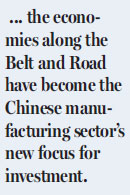Since President Xi Jinping proposed the Belt and Road Initiative more than three years ago, China has made cooperation with the economies along the Belt and Road a top priority.
Last year, China's non-financial direct investment in the economies along the Belt and Road reached $14.5 billion, accounting for 8.5 percent of China's overall foreign investment. And in the first quarter of this year, China's non-financial direct investment in those economies increased 5.4 percent year-on-year to reach $2.95 billion, which was 14.4 percent of China's total non-financial direct overseas investment during the period.
Till now Chinese enterprises have established 56 economic and trade cooperation zones, and invested more than $18.5 billion in 20 economies along the Belt and Road, generating about $1.1 billion in tax revenues and creating 180,000 new jobs in the host economies.
But Chinese enterprises also face many problems in Belt and Road ventures. Last year, Chinese enterprises' contract value for construction projects along the two routes was 47.7 percent of their total contract value for overseas construction projects, which shows Chinese enterprises' direct investment along the Belt and Road is still insufficient.
Besides, China's manufacturing sector is not so enthusiastic about investing abroad. Chinese enterprises' investment in the manufacturing sector overseas was $31.1 billion last year, or 18.3 percent of overall Chinese investment aboard, which is lower than the ratio of foreign investment in China's manufacturing sector.

There is need for China's manufacturing enterprises to more actively participate in the Belt and Road Initiative, and deepen investment cooperation with the economies along the two routes to help China's manufacturing sector to truly "go global" and cultivate new economic growth poles.
China's policy orientation and the pressure of domestic market will ultimately prompt Chinese enterprises to more seriously take part in the Belt and Road Initiative. The central government's guideline on promoting cooperation in international production capacity and equipment manufacturing encourages Chinese enterprises to participate in 12 sectors, including chemical engineering, power generation and automobile.
The central government has also provided multi-channel support for international production capacity cooperation at the diplomatic and economic levels. And deeper international production capacity cooperation will facilitate the implementation of the Belt and Road Initiative.
Chinese enterprises have achieved initial success in reducing overcapacity. In the first quarter of this year, the rate of capacity utilization of industrial enterprises above the designated size rebounded to 75.8 percent, but it was still lower than the reasonable level. Many industries, in fact, still face the problem of overcapacity.
In general China's manufacturing sector lacks investment opportunities, which prompts Chinese enterprises to seek investment opportunities abroad. Therefore, the economies along the Belt and Road have become the Chinese manufacturing sector's new focus for investment.
Many manufacturing projects have started in the economies along the Belt and Road. For instance, Geely Auto has established six knockdown plants in countries such as Egypt and Sri Lanka, and its new complete knockdown plant in Belarus will start operation later this year. And many Chinese iron and steel companies, including Metallurgical Corporation of China and Magang (Group) Holding, are seeking investment cooperation in iron and steel production in Kazakhstan.
Moreover, the economies along the Belt and Road provide great investment space for Chinese manufacturing enterprises. In general, these economies are at the early stage of industrialization with a relatively weak industrial base, which can hardly meet domestic market demand. And to expedite the pace of their industrialization, these economies are offering some preferential policies to attract foreign businesses and investment, which is an attractive proposition for China's manufacturing enterprises.
Liu Xingguo is a researcher at the Chinese Enterprise Confederation, and Shen Guiping is a PhD candidate at the Business School of Central University of Finance and Economics.
